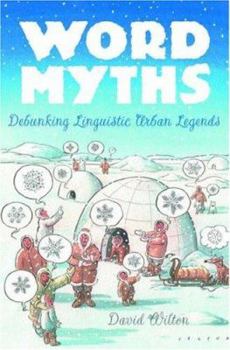Word Myths: Debunking Linguistic Urban Legends
Select Format
Select Condition 
Book Overview
Do you "know" that posh comes from an acronym meaning "port out, starboard home"? That "the whole nine yards" comes from (pick one) the length of a WWII gunner's belt; the amount of fabric needed to make a kilt; a sarcastic football expression? That Chicago is called "The Windy City" because of the bloviating habits of its politicians, and not the breeze off the lake? If so, you need this book. David Wilton debunks the most persistently wrong...
Format:Hardcover
Language:English
ISBN:0195172841
ISBN13:9780195172843
Release Date:December 2004
Publisher:Oxford University Press, USA
Length:240 Pages
Weight:0.90 lbs.
Dimensions:0.8" x 5.8" x 8.2"
Customer Reviews
5 ratings
Linguistic Urban Legends Debunked
Published by Thriftbooks.com User , 17 years ago
Have you heard that Eskimos have 500 words for "snow"? What does the international distress signal "SOS" mean? Do you know what an "aptronym" is? Have you noticed that some nautical enthusiasts attribute a maritime origin to nearly every word or phrase? This observation prompted one participant of an online discussion group to use the acronym "CANOE" to mean the "Conspiracy to Attribute Nautical Origins to Everything"! You'll discover that many etymologies you thought you "knew," you really didn't know at all. This little 200-page book was just great fun and most enlightening to read. I've referred to it often in my university communication classes -- a great resource for anyone interested in the origins and use of English words and phrases -- well researched and well written. Kudos to author David Wilton!
A lively read
Published by Thriftbooks.com User , 17 years ago
Wilton has a lively writing style, his research is impeccable, and his choice of topics is interesting. I particularly liked the article on which the clever cover is based. He is the author also of A Way With Words, an electronic newsletter that presents linguistic facts and debunks factoids, a word probably related to truthiness, a recent entry.
And who says so
Published by Thriftbooks.com User , 17 years ago
I don't know if the title is an intentional play on words (wordsmiths in this case) but I found "Word Myths, debunking linguistic urban legends" by David Wilton a delightful and easy read. Wilson begins by explaining how word myths come about and that they are really a significant subset of all urban legends and e-mail hoaxes which themselves come from a line of tall tales and Xerox fables. He also explains that debunking word myths is a thankless task since so many of the tales we hear, we WANT to believe and do not easily forgive those who attempt to correct our beliefs. "Word Myths" covers such diverse topics as whether picnic refers to a Southern lynching party, whether pumpernickel has something to do with Napoleon's horse, and whether a tinker's damn should really be spelled ticker's dam. Most cases in the book are selected because they are wrong or highly suspect. But a few are verified as possible or even probable. Like a good scientist, Wilson doesn't like to ever conclude that something is definitely proven. He does feel that some word myths can definitely be disproven -usually because the chronology of when it first shows up in the language. This would be a fun coffee table or back of the toilet type of book. But it even makes for good armchair reading.
Interesting....
Published by Thriftbooks.com User , 18 years ago
As an english professor and avid reader, I enjoy having this resource available to my classes. It fits well with etymology lessons, especially when students ask the origin of certain phrases or cite some "urban legend" about a word's source.
I was surpirsed how many I knew - incorrectly
Published by Thriftbooks.com User , 18 years ago
We have all heard stories of where different words and phrases originated. Some are quite fascinating and most are at least somewhat logical. The problem is that many of these legends are simply wrong. With a long list of word myths that include "dirt poor", "devil to pay", "under the weather", "real McCoy", "squaw", and "kangaroo" it is a fascinating read that not only debunks the traditional myths but also, where possible, supplies the correct origin of the word or phrase. Word Myths: Debunking Linguistic Urban Legends is hard to put down once you get started and thoroughly entertaining from beginning to end - highly recommended.




